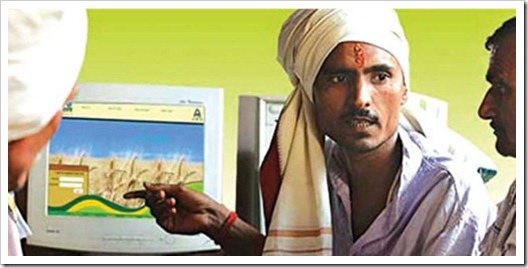Large swathes of India continue to remain isolated from the rise of information technology and the accompanying economic boom, with the result that migration to urban areas is still considered to be one of the first steps towards success.
With the success of some recent rural welfare programmes and the removal of misery from some quarters, will information technology serve to enrich our villages?
Internet penetration in villages is still quite poor, with estimates pointing to just 2% having access to the web. With as many as 70 to 80% of all Indians living in villages according to varying estimates, that number is miniscule.

[Img src]
In spite of the challenges, headway has been made in making the lives of some farmers easy with the help of internet connectivity. Stories of farmers gathering at village panchayat offices or kiosks to ascertain the day’s market rates through the internet are not unheard of.
Some villages have dedicated internet-based services that send out SMS’s to subscribed farmers for similar information, to help them get fair deals from distant markets. Examples of these are few and far between, but can serve as role models to trigger an internet revolution in India’s countryside.
Positive Signs in IT Empowerment
The biggest positive sign in the growth of telecommunications is that mobile phone usage has been impressive in villages, with nearly one-third of the 930-million-odd India-wide subscribers hailing from there. This has been largely aided by a frugal engineering revolution that brings the cheapest possible services to the masses, and there are hopes that this will pilot the spread of the internet to bring greater volumes of information for consumption.
Another major hope for IT empowering rural India is the convergence phenomenon in computing. Cheap smartphones and tablets manufactured by Indian companies can bring comprehensive information to farmers and students who need it, at short notice.
However, hurdles are already being observed on this front, with the manufacturer of the world’s cheapest tablet, Ubislate, behind schedule in getting orders fulfilled. Unfortunately, the quality and capabilities of currently available cheap devices are always a subject of intense debate.
The introduction of technology such as BSNL’s video telephony can redefine several areas concerning rural India, including farming, education and remote medicine.
In Conclusion
Information technology is often said to be a secondary force in empowering the masses, and in the context of rural India, this is understandable because millions of people still haven’t tasted the modern gift of electricity. Excessive reliance of monsoons and poor irrigation have driven farmers deeper into debt, leading to many take their own lives. Healthcare and sanitation has been dismal, and any IT related project requires basic literacy for it to work.
Can IT instead be a propelling force to modernize the villages? With the basic amenities in place and the right channeling of efforts, I strongly believe IT can be actively used in mass literacy and welfare programmes, ultimately providing an opportunity for all rural citizens to expand their horizons and live better lives.

Betterment of all rural areas wud be Ahead and its most welcome! GTK! I neva thought I wud get to c this comment here.
Villagers have to take initiatives and come forward if they want to be part of booming india….As far as i know Indian villages have illiteracy rate, superstitious,orthodox etc etc issues…if villagers want to gain something they will have to put affords come forward….come out of their comfort zone that culture where they have been living for 1000s of years and which has been obsolete years back
Betterment of all rural areas wud be Ahead and its most welcome!
Betterment of all rural areas wud be Ahead and its most welcome!